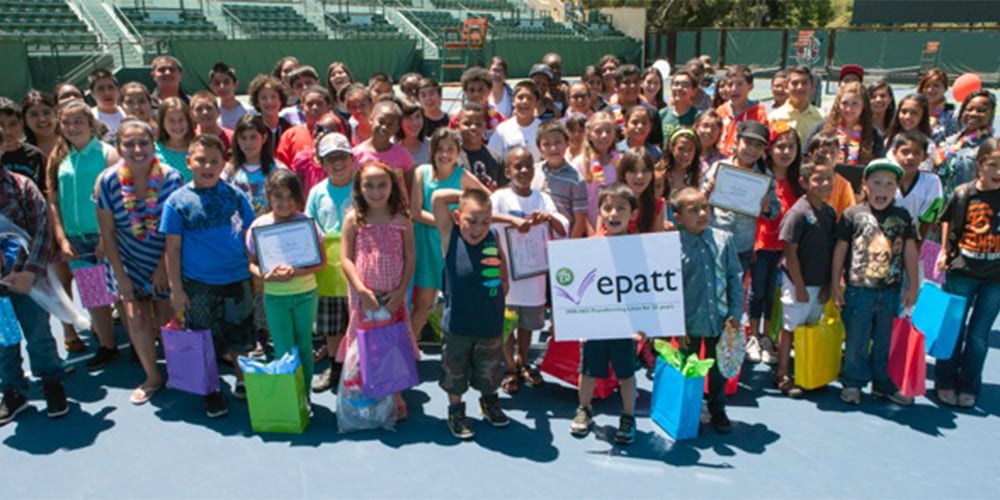Come August 2019, East Palo Alto Tennis and Tutoring (EPATT), an independent non-profit youth development organization with deep ties to the Stanford community, will no longer be allowed to conduct its services on campus as its contract with the University comes to an end.
The group has been on campus for 20 years and provides one-on-one tutoring, tennis instruction and parent coaching to families with children in kindergarten through 12th grade.
The “growing needs of the Stanford Athletics Department — including programming support for student-athletes and the expansion and creation of recreational and wellness programs for students and staff” — led Stanford to end the agreement that allows EPATT to use its facilities, wrote University spokesperson E.J. Miranda in an email to The Daily.
Executive Director of EPATT Dave Higaki shared that other groups currently operating on campus were also affected, although he declined to name any specifically.
According to academic director and middle school group director Kesha Weekes ’97, EPATT originally intended to remain at Stanford only for a temporary period while its leadership searched for a more permanent space.
“We’re an East Palo Alto-based nonprofit,” she said. “That’s where we were born. That’s where our kids come from. That’s where our heart is.”
In the late 1990s, one of EPATT’s board members, Dick Gould BA ’59 MA ’60, suggested that the group conduct its operations in the newly built Fluegel Conference Room of the Taube Family Tennis Stadium at Stanford while looking for a permanent facility elsewhere. At the time, the facility had none of its current furnishings — no windows, doors or classrooms — and was merely an undeveloped cement floor with spray-on insulation.
“The months became years, and eventually we all recognized that being here has a lot of advantages,” Weekes explained.
Stanford students no longer had to commute off-campus in order to volunteer, and EPATT’s volunteer base grew to its current size of 120 Stanford student tutors. EPATT was also able to utilize Stanford’s tennis courts and raised $1 million through a capital campaign, half of which went into an investment in lighting for eight tennis courts. The other half went into developing the Conference Room into what it is today: fully-functional classrooms stocked with computers, books, desks and other academic supplies.
EPATT emphasizes students’ development of study skills beginning at an early age in order to prepare them to achieve future goals such as attending college or going to work. The organization also works to help students feel socially and emotionally connected with each other and with their teachers. Outside of academics, the program helps kids to develop team-building skills and sportsmanship through tennis.
“Helping students achieve their dreams is what we’re really trying to do,” Weekes said. “We want people to actually be competitive in the thing that they say they want to do so that they can actually achieve it.”
Aside from supporting students through academic tutoring and tennis instruction, EPATT also works hard to prioritize parent coaching.
“At the gate we put stock in relationships that we have with the parents that are bringing their children here,” said elementary school group director Christina Erwin ’00. “[It’s important] for us to make sure that we’re supporting them, to make sure that they’re empowered and continue to advocate for and support their children outside of EPATT.”
Students can choose to remain with EPATT for as long as they wish, and this year’s senior class has some students who have been with the program for over a decade. Several are preparing to go to college at universities such as the University of Southern California, Northwestern, Loyola Marymount and St. Mary’s.
“Last year’s senior class had a student who when he came to us in eighth grade couldn’t read,” Weekes said. “We worked with him, and now he’s a sous chef at a restaurant that just received a Michelin star in San Jose.”
Erwin agreed, stating that the most rewarding part of the program for her has been having successful graduates of the program return to visit.
EPATT has also left a mark on the lives of its volunteers. Both Weekes and Erwin expressed their gratitude to all tutors and tutor coordinators at Stanford who have given their time to EPATT.
“Stanford has been a wonderful partner,” Higaki said. “But I think one of the underlooked things is how much of an impact we’ve made on the Stanford student experience.”
Several Stanford volunteers have remarked that EPATT “kept [them] sane” and significantly influenced them, Higaki said.
Weekes expressed a similar view, stating that many undergraduate tutors who were originally studying STEM-exclusive topics decided to minor or double major in the social sciences or humanities after working with EPATT.
“There are people at Stanford who have no concept of what our students’ experiences have been,” Weekes said. “It really changes their mentality about the world they live in and what they can potentially do to impact it.”
Erwin echoed her sentiment, citing a Ph.D. student in nanotechnology who, after volunteering at EPATT, decided to become a high school math teacher in Boston.
“We want people to leave Stanford with [not only] their degree and all the wonderful things that brings … [but also with] an attitude and a mentality of giving when they leave,” Weekes said.
Contact Claire Wang at clwang32 ‘at’ stanford.edu.
